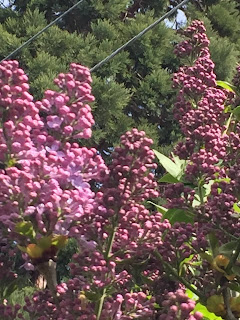Before I sat down to write, I knew it had been a long time since my last post in this blog. But I was surprised when I saw that my most recent post was nearly two years ago! Like the last post, I am writing today as temperatures drop and winter approaches. As I cut back some of our shrubs and flowering vines, the backyard is beginning to look barren. In fact, the past two years have seemed barren, with never-ending reports of COVID-19 lockdowns, surges and new strains.
I turned 60 this year, which means I am considered “senior” in some circles. The occasional senior discount is always welcome! But I can’t help noticing the stereotypes that persist about people over 60. Even in some churches, it’s not unheard of to see a maximum cutoff age of 45 for ordained ministry. In many ways, the world tells us that after a “certain age,” we are barren — not just regarding our ability to bear children, but our ability to contribute and inspire.
I beg to differ. I’ve lost count of the number of older people God uses in the Bible. There’s Noah, Moses, Sarah and Elizabeth. Hannah cried out to the Lord and gave birth to Samuel. Naomi lost her sons and Ruth lost her husband in an age when no husband or sons meant no future. But both women carried on with faith and grit and found new hope. Barrenness is not a life sentence in the Lord’s eyes.
“…the LORD remembered her plea, and in due time she gave birth to a son. She named him Samuel, for she said, ‘I asked the LORD for him.’” 1 Samuel
1:19-20 (NLT)
“The LORD kept his word and did for Sarah exactly what he had promised.” Genesis 21:1 (NLT)
“Then the women of the town said to Naomi, “Praise the LORD, who has now provided a redeemer for your family! May this child be famous in Israel. May he restore your youth and care for you in your old age. For he is the son of your daughter-in-law who loves you and has been better to you than seven sons!” Ruth 4:14-15 (NLT)
But barrenness doesn’t always refer to childlessness. We can experience many kinds of dry spells that make life seem like a wasteland. We long to conceive and give birth to something new. We cry out to God and wonder if our cries are heard.
At times during the past two years, I felt adrift in a spiritual wasteland. I believed that something new was waiting to be born, and I rushed here and there trying to make it happen. I busied myself with church work, becoming a Deacon and eventually Deacon Moderator. The work blessed me richly, but I still felt depleted and sad. Then I immersed myself in Zen Buddhism, where I met lovely people but still felt spiritually and creatively exhausted.
Things began to turn around this summer and fall. I was intrigued by a sign announcing that a new church was holding worship services about a block from our house. “Love God. Love people,” the sign said. Then a couple of weeks ago, I was waiting for a city bus, heading home after doing errands. A young man sat next to me and began talking about Jesus and the Bible.
“I hope you and your husband will open that book,” he said. We did. And I finally started attending the new church. It’s tiny — 30 people at most — but growing.
At my new church, we are studying the book of Ruth. I am reminded that God uses our circumstances to achieve His purpose for our lives. Like Ruth and Naomi, we can feel lost and even bitter. We work and wonder if we are still part of God’s plan.
But God still has a purpose for me. I see hints of it with every “coincidence” and prompting. Where I once saw bewilderment and disappointment, I now sense a creative stirring. A quickening. A new story waiting to be born.
“For I know the plans I have for you,” declares the Lord, “plans to prosper you and not to harm you, plans to give you hope and a future.” Jeremiah 29:11 (NIV)
“Forget the former things;
do not dwell on the past.
See, I am doing a new thing!
Now it springs up; do you not perceive it?
I am making a way in the wilderness
and streams in the wasteland.” Isaiah 43:18-19 (NIV)
How about you? When have you experienced barrenness and cried out to God? What are the wombs that God has opened in your life? What new thing is waiting to be born?





















